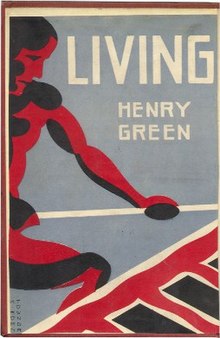Living (novel)

First edition
|
|
| Author | Henry Green |
|---|---|
| Country | United Kingdom |
| Language | English |
| Publisher |
J. M. Dent (UK) E. P. Dutton (US) |
|
Publication date
|
1929 |
| Media type | |
| Pages | 269 |
Living is a 1929 novel by English writer Henry Green. It is a work of sharp social satire, documenting the lives of Birmingham factory workers in the interwar boom years. It is considered a modern classic by scholars, and appears on many University syllabi. The language is notable for its deliberate lack of conjunctives to reflect a Birmingham accent. As well, very few articles are used, allegedly to mimic foreign languages (such as Arabic) that use them infrequently. It is considered a work of Modernist literature.
The novel has been acclaimed for making Green "an honorary member of a literary movement to which he never belonged", i.e. the genre of proletarian literature. Despite his class origin and politics, the novel has been acclaimed as "closer to the world of the working class than those of some socialist or worker-writers themselves".
Living tells the story of several iron foundry workers in the west midlands city of Birmingham, England in the 1920s. It also follows, though in much less detail, the lives of the foundry's owners and, in particular, their social living. The key narrative progressions centre on Lily Gates, the novel's female protagonist, and her courting with Bert Jones, one of the factory workers. They seek an opportunity to escape the British working-class existence by travelling abroad. Crucial to their attempted elopement is Lily's desire to work. She is constantly stifled in this venture by the man she calls 'Grandad', Craigan, who is her father's best friend and with whom she lives. Craigan tells Lily that ' "[n]one o' the womanfolk go to work from the house I inhabit' ". This represents the male hierarchy's imposed ownership on everything physical and even metaphysical—Lily's freedom—in addition to the impossibility to seek an escape route. This is the struggle that drives the novel, and is one of the reasons it is considered Modernist.
While Bert and Lily's trajectory is away from Birmingham, Young 'Dick' Dupret's novelistic journey takes him toward Birmingham and the factory there. His father falls ill during the novel and dies, leaving the business to his son. There are many disputes between Dupret and Mr Tarver in particular, who is the factory's foreman and fulfils the day-to-day running duties of the factory. Mr Tarver fears for his job as Dupret seeks to renovate the factory and its workers. Indeed, he retires the dozen or so workers who are within just a few months of the national pension age. Again, the shifting world and entropic status of the factory and the workers places the novel in its Modernist category.
...
Wikipedia
